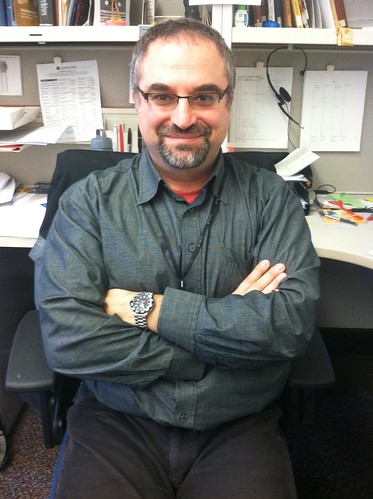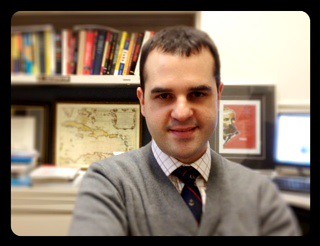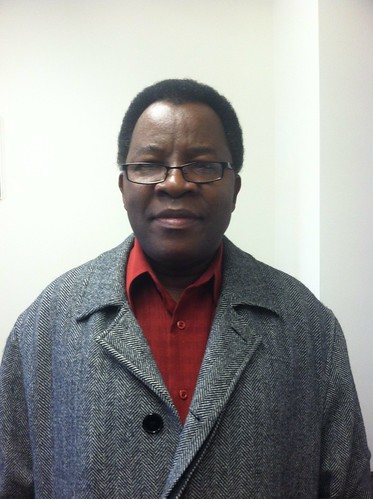Today, as part of our ongoing staff interview series, I am pleased to introduce you all to Dmitry Tartakovsky, the South Slavic specialist in the International and Area Studies Library’s Slavic References Service. When I first began here at the International and Area Studies Library, I quickly realized how big and how busy the Slavic References Service was. I was immediately curious about the people working in the Slavic Reference Services and was happy to interview Dmitry so that I and the rest of the Glocal Notes community could get to know him.

Dmitry Tartakovsky, the South Slavic specialist at the International and Area Studies Library.
Could you tell me a bit about your background?
I was born in Kiev, now Ukraine but then the Soviet Union. My parents and I came to the U.S. as refugees in 1978. We spent the first year in Baltimore, the second in Chicago, and then moved to Skokie (outside Chicago) where I established some stability. After Niles North High School, I attended Bradley University in Peoria for my Bachelor’s, then Arizona State University for my Master’s and UIUC for my PhD. All of my degrees are in history.
What attracted you to librarianship?
When I started the history program here many years ago, I took an assistantship in Slavic cataloging at the Slavic Library, when it was managed by Bob Burger and employed dozens of people. I was trained by Ed Napier. Much later, when I was completing my PhD, there was a place for me as an academic hourly at the Slavic Reference Service working for Helen Sullivan. I enjoyed reference the most, because each query was like a puzzle, and completion was doubly satisfying because we would later usually receive grateful replies from our patrons.
What area did you decided to specialize in and why?
I was always fascinated with Russia and Eastern Europe because of roots my there. This is what led me to pursue history of the region, in order to understand where I came from and why I ended up here. It was natural that if I offered anything to library science it would be in this region since it is the region I know well culturally and linguistically.
How many languages can you speak and did you learn them as an adult?
I am a fluent Russian speaker, which was my first language (I began learning English at age 8). As an adult I learned Macedonian, which I still speak well after living in Skopje for more than two years during the 1990s. I also learned Yiddish, which I needed for my dissertation research, and Romanian, for the same reason. I can speak some Yiddish, but my Romanian is mostly limited to reading and listening comprehension. I can get by in other south Slavic languages like Bulgarian and Serbian, but I have not really studied them formally.
What career advice would you give to someone who is interested in librarianship or someone who wants to specialize in your area of interest?
Honestly this is a question I am not very qualified to answer, since I never planned to be a librarian and it happened to me accidentally. Also, it is also not likely to be a field I will remain in much longer. From what I have seen, it is important to acquire specialized skills while also being knowledgeable about different aspects of librarianship, including cataloging, reference, digitization, etc. As in any field, it is helpful to read what people are publishing in order to know where the field is headed. This will certainly aid in landing a job.
In terms of specialized regional knowledge, I would make sure I understand that this is no longer what moves the field, not like it did when I went to graduate school. It seems to me that librarianship is no longer as focused on area knowledge as before, rather technical knowledge is considered paramount. Nevertheless, if one is interested in being a Slavic area reference librarian, an area studies degree is very useful, and obviously language skills are central, so actually living in the region is very helpful in additional for formal language training.
What are your proudest accomplishments as a librarian?
I was able to do several things. I explained the importance of the work of the Slavic Reference Service (SRS) to an audience of State Department officials a couple of summers ago. I have been able to contribute to the collection of SRS online reference guides. I have helped hundreds of scholars and students of the region over the more than two years I’ve been here. I have also had the opportunity to teach three courses on the region for REEEC, the Russian, East European, and Eurasian Center, with which our staff at the SRS works closely. Mostly, I have had the pleasure of working with some great librarians, including Helen Sullivan, Joe Lenkart, Jan Adamczyk, Larry Miller, and Ula Biegaj.
What is something at the International and Area Studies Library that people should know about?
This is an easy one for me—the Slavic Reference Service is without question the most unique and recognized aspect of the IAS library. The SRS is known internationally because of its nearly forty years of specialized service in assisting patrons with their research to an extent that literally no one else in the world offers. This was made possible due to the funding of the Department of State through Title VIII grants, which the SRS has received annually for more than thirty years, but which are likely now finished. Without this funding, it is unlikely, to my mind, that the SRS will be able to focus on research queries and guides like in the past.
What are your research or collection development interests?
My research interests are within my field of history. I am interested in nationalism in Eastern Europe in the interwar years, particularly among the Jewish minority, and the impact of different political systems on the development of modern national identity.
When you’re not working, what hobbies do you have? What do you like to do around the Champaign-Urbana area?
I spend a lot of time with my son Alex. He likes swimming, climbing and going to the mall. Between him and work I don’t have much free time, but I enjoy watching movies, reading, going out to eat, playing softball, biking, and hanging out and drinking with good friends.
Describe a typical day at your job.
I usually handle immediate emails and issues when I first arrive, such as queries from patrons here at UIUC and at other institutions, which we receive primarily via email and assistance requests from the ILL department. If there is time left after handling these questions I work on research guides. Lately I have not had much time for guides because I have taught two classes this last fall and one last spring. The summers are busy for us with the Summer Lab, when scholars from all over the world come to use the fabulous Slavic and East European collection here at UIUC. Summer days are therefore very hectic and not similar to the rest of the year. Next year I will not be teaching so I expect I will get more work done on writing research guides, at least until August, when my contract expires.
We hope that this interview has been helpful in getting to know Dmitry and some of the services available at the International and Area Studies Library and the Slavic Reference Services.



